British newspaper bosses hit back at claims they are ‘fuelling anti-transgender moral panic’
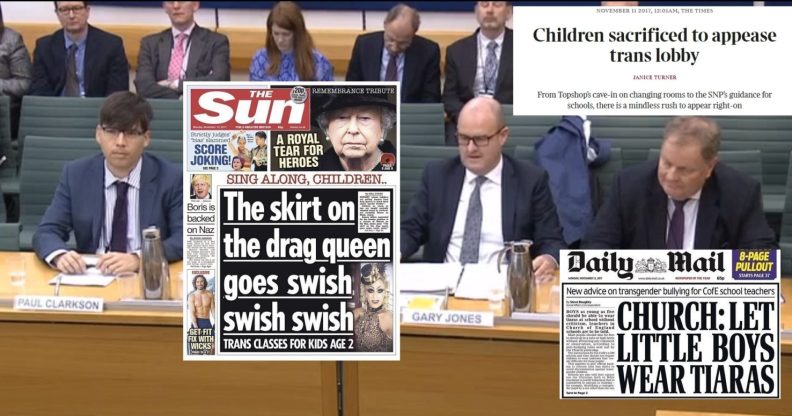
UK newspaper editors have defended themselves from criticism after a surge in negative coverage of transgender issues led to accusations of inciting “moral panic.”
Representatives of The Sun, The Times, the Daily Mirror, the Daily Express, the Daily Telegraph and Metro all appeared before Parliament’s Home Affairs Committee’s hate crime inquiry on Tuesday to answer concerns that the media has fuelled hostile sentiment towards minority groups.
Labour MP Stephen Doughty used the opportunity to challenge newspaper bosses over a spike in of negative stories about transgender people.
Former Labour leader Ed Miliband recently warned about a “moral panic” on transgender issues in the British press – after months of negative stories and columns relating to transgender people.
Echoing the concerns, Doughty said: “There appears to me to be a concerted effort by certain publications at the moment to promote some extremely unpleasant transgender hate material.”
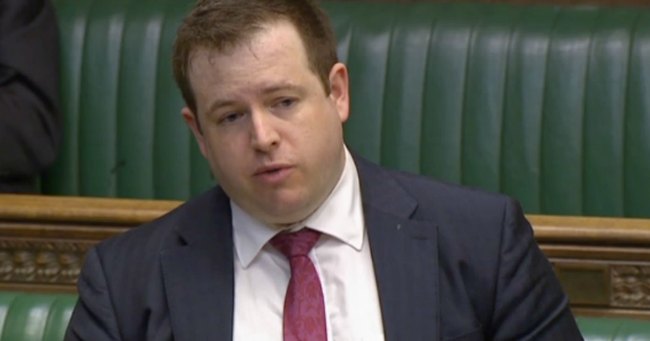
Labour MP Stephen Doughty
Doughty continued: “There’s the Daily Mail [November] 2017 headline, ‘Church: let little boys wear tiaras,’ and The Sun in November with: ‘Now kids, it’s Alice in Transgenderland,’ ‘The skirt on the drag queen goes swish, swish, swish’ and ‘Trans classes for kids aged 2’ on the front page.
“Very recently, in March 2018, there was ‘Tran and wife.’ You’ll recall the horror of the couple involved. I thought it was absolutely disgusting, quite frankly.
“In the Express, there was Leo McKinstry talking about transgender people tightening their ‘demented grip on our society,’ ‘the growing pattern of transgender madness’ and ‘making a mockery of biological science.'”
Doughty added: “I have been very disappointed, particularly with the Telegraph and The Times, to see both publications jumping on the anti-trans bandwagon. There have been an increasing number of stories focusing on the issues around the trans community in The Times that seem to have been given particular prominence in recent months.
“The Times opinion piece in November 2017 had the headline, ‘Children sacrificed to appease trans lobby.’ You will understand why that is a particular concern, given the previous use of ‘gay lobby,’ ‘Jewish lobby’ and all of those sorts of things.
“[The Telegraph is] carrying pieces… Alison Pearson in October: ‘Will our spineless politicians’ love affair with LGBT ever end?’ Norman Tebbit, 17 October: ‘We need to investigate the causes of this sudden transgender explosion,’ and a piece, ‘Trans survey for 10-year-olds.'”

(L-R) Paul Clarkson, Managing Editor, The Sun; Lloyd Embley, Group Editor-in-Chief, Trinity Mirror; Gary Jones, Editor-in-Chief, Daily and Sunday Express; Peter Wright, Editor Emeritus, Associated Newspapers; Ian Brunskill, Assistant Editor, The Times; Ian MacGregor, Editor Emeritus, Telegraph Media Group; Ted Young, Editor, Metro.
Addressing the editors Doughty added: “Nearly half of all transgender schoolchildren have attempted suicide. 41 percent of all transgender people have suffered hate crime just in the last year.
“When we see the suicide and hate crime figures, do you accept any responsibility whatsoever for generating the type of atmosphere that transgender people face in this country?”
Ian Brunskill, Assistant Editor of The Times, told the MP the newspaper’s continued coverage of trans issues was reflective of the “very fierce debate” on the subject, referencing disputes “within your own party” after Labour faced protests from anti-transgender activists.
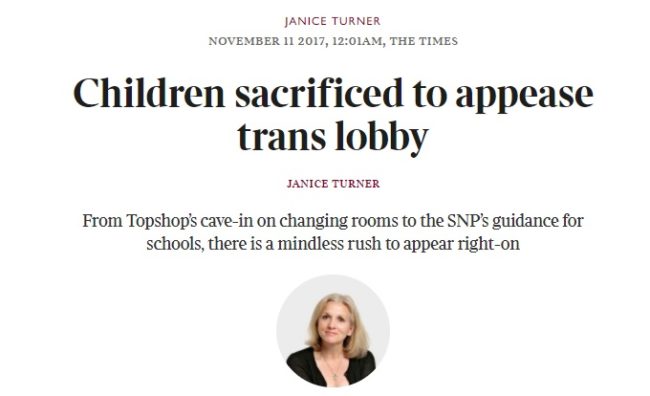
Of the use of the headline ‘Children sacrificed to trans lobby,’ Brunskill added: “I can’t remember what sort of piece that was on, but I agree, the language there strikes me as slightly emotive.
“It was an opinion piece and that was the opinion being expressed, then the headline should quite reasonably express the opinion that the article is expressing.
“It is appearing on an opinion column. It is a fair reflection of a column that we have carried. We are quite happy to carry the column.”
Pushed by Doughty on whether the term “trans lobby” was acceptable, he said: “I don’t have any objection to that. There is a lobby, or rather there are several transgender lobbies.”
Asked if he would use the term ‘gay lobby’ or ‘Jewish lobby’, Brunskill replied: “If there were one.”
Brunskill proceeded to claim that “the newspaper has no line” on transgender issues and attributed most of the concerns to Times writer Janice Turner, who he asserted “is the only columnist who is doing this.”
He added: “The debate within the trans community has shifted quite dramatically and quite violently, in some ways, as you know. It has become about who is a member of it, essentially. It has become about self-definition. This is the toxic issue here. Janice has taken quite a firm view on that.”
Brunskill continued: “There is no sense that we are poking people with sticks on this. There is a bigger picture.
“We have a columnist who has a particular view on this issue, and the headlines on her column reflected the strength of feeling that there is around this issue in the kind of area that she is operating in. In no sense does that reflect the bigger picture of The Times’s take on this.”
Speaking about a piece that describes trans people as “demented,” Express editor Gary Jones said: “It is a comment piece. I suppose he is entitled to give his opinion within that. I would argue that newspapers have come a long way in the last 10, 20, 30 years on transgender.”
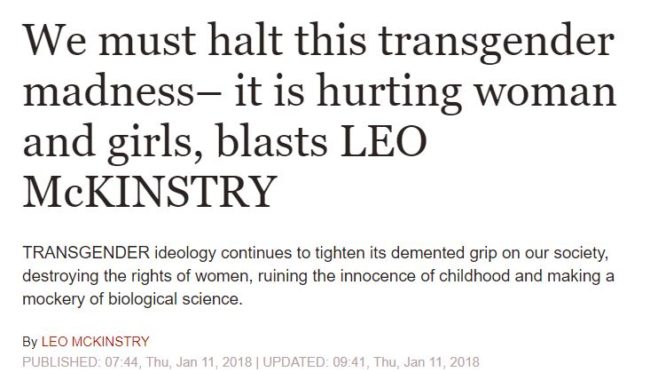
He added that “newspapers and editors, like myself, are very much aware that you need to get every single word right.”
Ian MacGregor of the Telegraph also denied his newspaper was waging a campaign against transgender rights.
He said: “We take the coverage of these issues so seriously. That is why, as members of IPSO and abiding by the code of conduct, we are very careful about the wording we use.
“We treat these issues with great sensitivity. One other piece of guidance that we watch very carefully is from IPSO to all its members on researching and reporting stories involving transgender individuals, which asks, and guides every reporter on a step-by-step approach, about whether mention of their sexuality is relevant, whether it is suitable to use certain ‘dead names’ and that kind of thing.”
He added: “Clearly, these are very sensitive issues and very important issues.
“It is important that our columnists and writers are entitled to their opinion in this world. Sometimes that can be upsetting. I would not be encouraging anyone to upset anyone, but the issues are quite sensitive. I think we reserve the right to upset if we have to, because these issues are important to discuss.”
Paul Clarkson, Managing Editor of The Sun, also hit back at allegations his newspaper had contributed to anti-trans coverage, saying: “I would actually say that The Sun is one of the most prominent media organisations to shed a light on transgender issues.
“We have an excellent relationship with a number of transgender lobby groups that we have been engaging with over a number of years.”
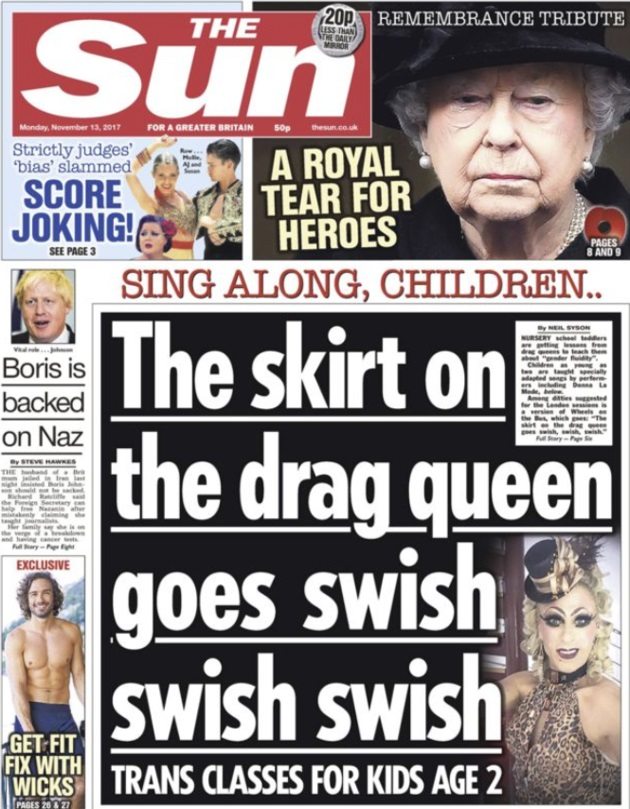
The boss added that he “completely refutes” criticism of the headline “Tran and wife” to refer to a transgender person getting married, claiming that “every word, headline and image was passed by transgender groups pre-publication.”
The couple involved in the story, Hannah Winterbourne and Jake Graf, have said they were “very disappointed when [the coverage] was let down by such an offensive and garish headline and front page.”
But Clarkson insisted: “With this story, we got their full blessing beforehand. There was no issue with ‘Tran and wife’ because you have three words to tell a story. It is not a front page story just to say, ‘Man marries woman.’
“The issue that some people within the community had was with the strapline along the top that explained that there was man that used to be women, marrying a woman who used to be a man.
“If anybody actually read the piece, everyone in the transgender lobby groups who we have spoken to were gushing with praise.”
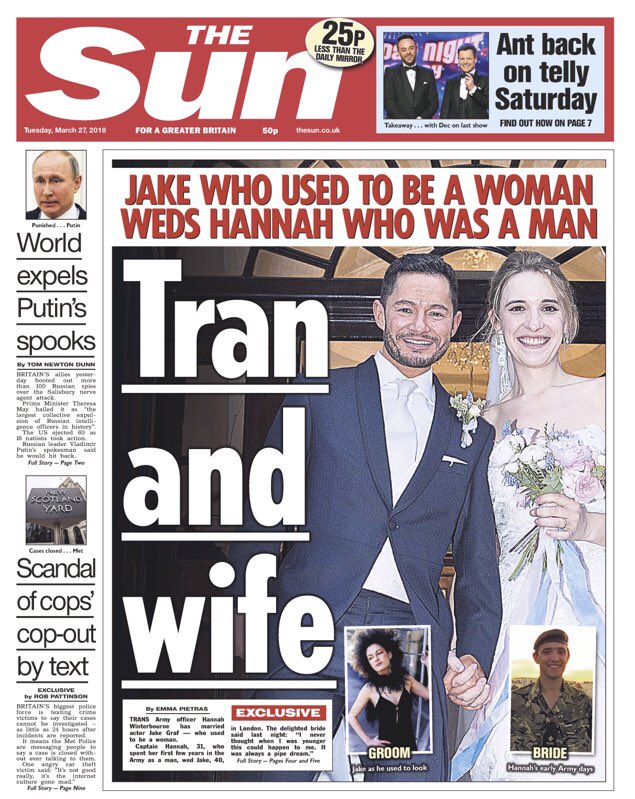
Elsewhere, Doughty sparred with Peter Wright of Associated Newspapers over the Mail‘s coverage of wider LGBT issues.
The MP raised a controversial Mail headline from 2016, when the paper ran a negative profile of three judges it claimed “blocked Brexit” by ruling that Parliament must sign off on actions to leave the EU.
Thee newspaper’s headline had described High Court judge Sir Terence Etherton as an “openly gay ex-Olympic fencer.”
Challenged by Doughty about why the headline referenced the judge was “openly gay,” Wright said: “As you recall this was a major story. These were three judges making an incredibly important decision. What newspapers do, when people who are not well-known to the public are, for some reason, filling a very important place in the news, is they run brief profiles of them.”
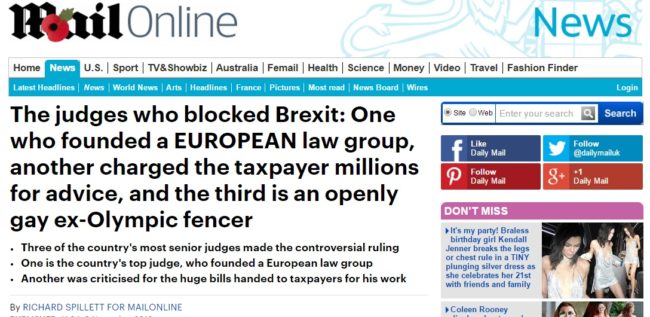
Asked why his sexuality was put in the headline, Wright said: “If you Google the particular judge involved, Sir Terence Etherton—he had become Master of the Rolls I think about six months previously—the first story that comes up is the Guardian report on his appointment, the headline is ‘Britain’s first openly gay judge becomes master of the rolls.'”
He added: “If you’re going to profile the three judges, you have to profile the three judges. Sir Terence Etherton happens to have made history by being the first judge [to be openly gay].”

